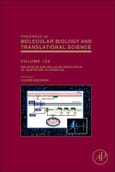Molecular Aspects of Exercise Biology and Exercise Genomics, the latest volume in the Progress in Molecular Biology and Translational Science series includes a comprehensive summary of the evidence accumulated thus far on the molecular and cellular regulation of the various adaptations taking place in response to exercise.
Changes in the cellular machinery are described for multiple tissues and organs in terms of signaling pathways, gene expression, and protein abundance. Adaptations to acute exercise as well as exposure to regular exercise are also discussed and considered.
Please Note: This is an On Demand product, delivery may take up to 11 working days after payment has been received.
Table of Contents
- Adaptation to Acute and Regular Exercise: From Reductionist Approaches to Integrative Biology
Claude Bouchard - Exercise and Regulation of Carbohydrate Metabolism
Joram D. Mul, Kristin I. Stanford, Michael F. Hirshman and Laurie J. Goodyear - Exercise and Regulation of Lipid Metabolism
Robert C. Noland - Exercise and Regulation of Protein Metabolism
Philip J. Atherton, Bethan E. Phillips and Daniel J. Wilkinson - Exercise and the Regulation of Mitochondrial Turnover
David A. Hood, Liam D. Tryon, Anna Vainshtein, Jonathan Memme, Chris Chen, Marion Pauly, Matt Crilly and Heather Carter - Endurance Exercise and the Regulation of Skeletal Muscle Metabolism
Frank W. Booth, Gregory N. Ruegsegger, Ryan G. Toedebusch and Zhen Yan - Exercise and the Regulation of Skeletal Muscle Hypertrophy
Chris McGlory and Stuart M. Phillips - Exercise and the Regulation of Adipose Tissue Metabolism
Thomas Tsiloulis and Matthew J. Watt - Exercise and the Regulation of Hepatic Metabolism
Elijah Trefts, Ashley S. Williams and David H. Wasserman - Molecular Mechanisms for Exercise Training Induced Changes in Vascular Structure and Function: Skeletal Muscle, Cardiac Muscle and the Brain
T. Dylan Olver, Brian S. Ferguson and M. Harold Laughlin - Exercise and Regulation of Bone and Collagen Tissue Biology
Michael Kjaer , Niklas Rye Jørgensen , Katja Heinemeier and S. Peter Magnusson - Exercise and the Regulation of Endocrine Hormones
Anthony C. Hackney and Amy R. Lane - Exercise and Regulation of Adipokine and Myokine Production
Sven W. Görgens, Kristin Eckardt, Jørgen Jensen, Christian A. Drevon and Jürgen Eckel - Exercise and the Regulation of Inflammatory Responses
Jacob Allen, Yi Sun and Jeffrey A. Woods - Exercise and the Regulation of Immune Functions
Richard J. Simpson, Hawley Kunz, Nadia Agha and Rachel Graff - Exercise Regulation of Cognitive Function and Neuroplasticity in the Healthy and Diseased Brain
Gilian F. Hamilton and Justin S. Rhodes - Exercise, Autophagy and Apoptosis
Frank C. Mooren and Karsten Krüger - Exercise and Stem Cells
Marni D. Boppart, Michael De Lisio and Sarah Witkowski - Exercise and Gene Expression
Mark Hargreaves - Exercise, Skeletal Muscle and Circulating MicroRNAs
Aaron P. Russell and Séverine Lamon - Exercise as a Polypill for Chronic Diseases
Helios Pareja-Galeano, Nuria Garatachea and Alejandro Lucia








